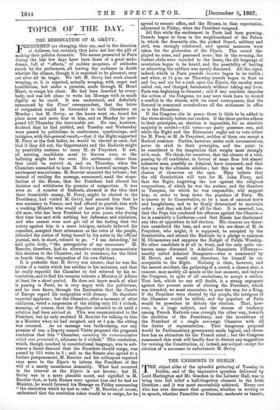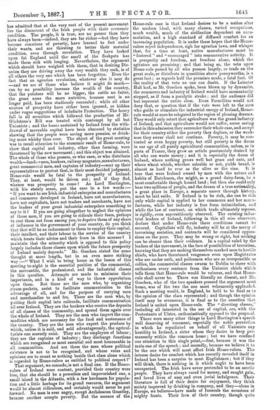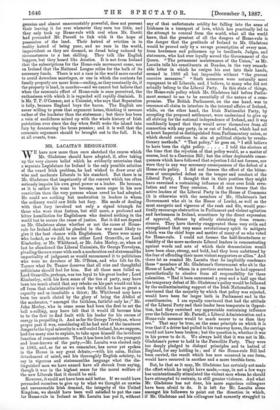THE UNIONISTS IN DUBLIN.
THE object alike of the splendid gathering of Tuesday in Dublin, and of the impressive speeches delivered by Lord Hartington and Mr. Goschen in the Leinster Hall, was to bring into full relief a half-forgotten element in the Irish Question ; and it was most successfully achieved. Every one who has ever discussed that question, whether in writing or in speech, whether Parnellite or Unionist, moderate or fanatic,
has admitted that at the very root of the present movement lies the discontent of the Irish people with their economic condition. The people, it is true, are no poorer than they have always been—indeed, they are far richer—but they have become conscious of poverty, have learned to fret under Their wants, and are thirsting to better their material condition, even through revolution. They have looked upon fat England until the smell of the fleshpots has made them sick with longing. Nevertheless, the argument which should have weighed with them, that in desiring Dis- union they are driving away the very wealth they seek, is of all others the very one which has been forgotten. Even the fact that an agrarian revolution, whatever else it may do —and we are of those who believe it might do much— can by no possibility increase the wealth of the country, that the potatoes will be no bigger, the cattle no fatter, the grass none the more nutritive, because rent is no longer paid, has been studiously concealed ; while all other sources of prosperity have either been ignored, or hidden under vague suggestions of indefinite Protection. The heavy fall in all securities which followed the production of Mr. Gladotone's Bill was treated with contempt by all but Unionists ; and the losses sustained by Ireland from the with- drawal of moveable capital have been obscured by statistics showing that the people were saving more pennies, or drink- ing more whisky than ever. The object of the great meeting was to recall attention to the economic result of Home-rule, to show that capital and industry, other than farming, were threatened by the new movement ; and this object was attained. The whole of those who possess, or who earn, or who distribute wealth—land e risers, bankers, railway magnates,manufacturers, great commercial men, and captains of industry—sent up their representatives to protest that, in their most decided judgment, Home-rule would be fatal to the prosperity of Ireland. They, at least, would be driven out ; and if they fled, whence was prosperity to come ? As Lord Harlington, with his stately sense, put the case in a few words :— If you want to see Irish industrial enterprise and manufactures and commerce developed in Ireland, have not manufacturers, have not capitalists, have not traders and merchants, have not the leaders of your great industrial enterprises something to say to it ? If you are going altogether to neglect the opinions of those men, if you are going to ridicule their fears, perhaps to cast them out from among you, to deprive them of any share of influence in the government of your country, do you think that that will be an inducement to them to employ their capital, their intellect, and their labour in the service of the country which treats their advice and their fears in this manner? I maintain that the minority which is opposed to this policy largely includes those classes upon which the future prosperity of Ireland mainly depends." Mr. Goschen stated the same thought at more length, but in an even more striking way :—" What I wish to bring home as the lesson of this meeting to-night is the essential position of the commercial, the mercantile, the professional, and the industrial classes in this question. Attempts are made to minimise their importance, and in a kind of way to throw opprobrium upon them. But these are the men who, by organising steam-packets, assist to facilitate communication to the advantage of all, and for the purpose of carrying men and merchandise to and fro. These are the men who, by putting their capital into railroads, facilitate communication all over Ireland. They are the bankers who receive the deposits of all classes of the community, and spread them again over the whole of Ireland. They are the men who import the com- modities which are necessary for the food and sustenance of the country. They are the men who export the produce by which, unless it is sold, and sold advantageously, the agricul- turists can scarcely exist. They are the employers of labour ; they are the captains of industry ; they discharge functions which are recognised as most essential and most honourable in all communities. And are these the men whose political existence is not to be recognised, and whose votes and opinions are to count as nothing beside that class alone which is regarded by Home-rulers as entitled to political respect I" That argument, we concede, is not a final one. If the Home. rulers of Ireland were content, provided their country were free, that she should be a powerless and impoverished one, a small island in the Atlantic, with a few herdsmen for popula- tion and a little herbage for its grand resource, the argument would be almost ridiculous, and certainly would never be put forward. No man is ever angry, except Archdeacon Grantley, because another accepts poverty. But the essence of the
Home-rule case is that Ireland desires to be a nation after the modern ideal, with many classes, varied occupations, much wealth, much of the civilisation dependent on accu- mulation, and a high standard of diffused comfort for an increasing population. It is under these hopes that the Home- rulers reject independence, sigh for agrarian laws, and whisper that, for a time at least, native manufactures must be " fostered " and "encouraged" into remunerative activity. It is prosperity and freedom, not freedom alone, which the agitators are promising ; and that being so, the veto upon Home-rule passed by all who possess largely, or trade on the great scale, or distribute in quantities above pennyworths, is a great fact ; as regards half the promises made, a fatal fact. Of the reality of that veto no one can doubt. If the Leineter Hall had, as Mr. Goschen spoke, been blown up by dynamite, the commerce and industry of Ireland would have momentarily stopped, as if from a paralytic stroke ; and the audience did but represent the entire class. Even Parnellites would not deny that, or question that if the vote were left to the men who guide or stimulate the industrial energy of Ireland, Home- rule would at once be relegated to the region of pleasing dreams. They would only retort that agriculture was the grand industry, of Ireland, and that agriculture would not suffer, never seeing that in this admission they surrender their whole case, and accept for their country either the poverty they deplore, or the weak- ness they swear shall not continue. Poverty, it may be con- tented or even happy poverty, but still poverty is the doom in our age of all purely agricultural communities, unless, as in parts of France, they grow an article passionately desired by all who can waste money ; and it is especially the doom of Ireland, where nothing grows well but grass and oats, and where wheat which, whether saleable or not, yields bread, is almost as hard to rear as the olive or the vine. It is true that were Ireland owned by men with the nature and habits of Dutchmen, she might, as a grand dairy-farm, be a most comfortable though humid land ; bat then she could only bear two millions of people, and the dream of a true nationality, a great place in Europe, a separate career through history, must be laid aside. If Ireland is to be rich, she can be rich only while capital is applied to her commerce and her manu- factures, while her industry is free from intimidation, and while the law of contract, on which trade ultimately reposes, is rigidly, even superstitiously observed. The existing indus- trial leaders of Ireland, following in this all wise observers, declare that under Home-rule these conditions cannot be secured. Capitalists will fly, industry will be at the mercy of terrorising societies, and contracts will be considered oppres- sions on the poor. They may be wrong or right, but nothing can be clearer than their evidence. In a capital ruled by the leaders of the movement, in the face of possibilities of terrorism, knowing that they are making themselves marked men to hostile chiefs, who have threatened vengeance even upon Magistrates who are under oath, and policemen who are as irresponsible as collies, the commercial classes swarm to Dublin to cheer with enthusiasm every sentence from the Unionist chiefs which tells them that Home-rule would be ruinous, and that Home- rule shall never be. There was literally no dissent, and Mr. Goschen, who of the two speakers pressed the argument most home, was of the two the one most vehemently applauded. Such a meeting would, in England, be held to be final as to the opinion of the class represented ; and though the opinion itself may be erroneous, it is final as to the assertion that Ireland is united upon Home-rule. The "directing classes," including all interested in the use of capital, are, with the- Protestants of Ulster, enthusiastically opposed to the proposal.
There were many other things in Lord Harlington s speech well deserving of comment, especially the noble peroration in which he repudiated on behalf of all Unionists any hostility to Ireland, a sister whom they desire to keep per- manently within the common home ; but we have confined our attention to this single point,—first, because it was the main one of the speech ; and secondly, because we believe it lo- be the one which will most affect Irish Home-rulers. The intense desire for comfort which has recently revealed itself in Ireland has been a surprise to most Englishmen ; but if they will think, there is nothing in it which ought to have been unexpected. The Irish have never pretended to be an ascetic people. They have always cared for money, and sought gain, and loved lives of easy and even jovial indulgence. Their literature is full of their desire for enjoyment, they think society improved by drinking in company, and they—alone in Europe, we believe—have made of funerals the occasions of mighty feasts. Their love of their country, though quite genuine and almost unaccountably powerful, does not prevent their leaving it for ever whenever they earn too little, and they only took up Home-rule with zeal when Mr. Davitt had persuaded Mr. Parnell to link with it the hope of possession of the land. Their hatred of eviction is in reality hatred of being poor, and no race in the world, improvident as they are deemed, so dread being reduced by circumstances to a last shilling. They talk like English beggars, but they hoard like Asiatics. It is not from Ireland that the subscriptions for the Home-rule movement come, nor on Ireland that the National League relies for the bulk of its necessary funds. There is not a race in the world more careful to avoid dowerless marriages, or one in which the contests for family property are more keen—ending, as they constantly do, if the property is land, in murder—and we cannot but believe that when the economic effect of Home-rule is once perceived, the enthusiasm with which it is regarded will rapidly diminish. It is Mr. T. P. O'Connor, not a Unionist, who says that Separation is folly, because England buys the bacon. The English are never willing to press that argument home, thinking it savours rather of the huckster than the statesman ; but there has been a vein of sordidness mixed up with the whole history of Irish patriotism ever since the day when Swift woke the island into fury by denouncing the brass pennies ; and it is well that the economic argument should be brought out to the full. It is, at all events, true.











































 Previous page
Previous page